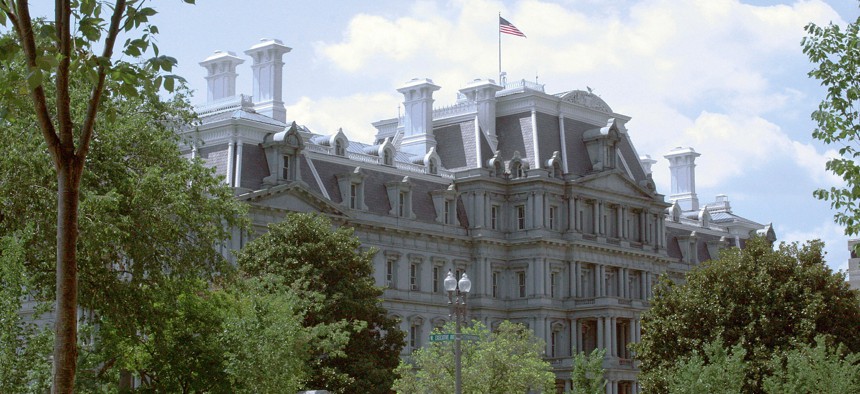
The White House’s Office of Information and Regulatory Affairs is looking to increase public comment and engagement in its crafting of regulations. KAREN BLEIER / Getty Images
Biden administration boasts it’s including more public input into agency rulemaking
Agencies hope to solicit more perspectives and boost trust in government.
Federal agencies are engaging more with stakeholders and members of the public in crafting regulations, the Biden administration said in its semiannual publication of upcoming rules.
The new approach will lead to better outcomes for agencies and the public, the White House said, arguing its rules will be more responsive to the public’s needs and prove more effective in their impact. President Biden required the updated tactic, highlighted in the administration’s Fall Unified Regulatory Agenda, in an executive order he issued in April to modernize the regulatory process.
Sam Berger, the associate administrator of the White House’s Office of Information and Regulatory Affairs, said this week the new regulatory agenda was the first in which agencies “discuss their efforts to encourage public participation and engagement in the rulemaking process and share how this engagement has informed the development of regulatory priorities.” Agencies will take that approach going forward, he said, and OIRA will seek feedback on how to boost public engagement in rulemaking early in the process.
Bridget Dooling, a law professor at The Ohio State University and a former deputy chief at OIRA, said that early engagement would prove key to the initiative’s success, calling it a “perceptive and promising idea.”
“The government often needs a way to check in with the people early on, in addition to the regular and important notice and comment process,” Dooling said. “This is a way to inform people how the agency’s thinking about its priorities and goals.”
In addition to creating more durable rules, Berger suggested the approach would boost trust in government as various groups and individuals can offer their input to agencies and subsequently see how their perspectives made an impact. Ali Bell, a spokesperson for the Office of Management and Budget, of which OIRA is a part, said the administration is making a concerted effort to reach communities that may have not previously weighed in on agency rules.
That will lead to better outcomes as “folks will believe in [the rules] because they were part of the process,” Bell said.
Sarah Hay, a policy analyst at The George Washington University’s Regulatory Studies Center, said the Biden administration was relying on “old tools” and expressed skepticism the new approach would lead to a dramatic increase in public participation.
“We don't anticipate that it will have a significant effect on the ‘demand side,’” Hay said, namely “whether the public actually wants to engage in the regulatory process, or is even aware of the regulatory process and that it's something they can and perhaps should engage in.”
As part of the new agenda, the Labor Department cited all the groups they engaged with in plotting their new rules.
“We intentionally seek input from members of the public who have not typically participated in the regulatory process, including workers with disabilities, union members, small businesses, low-paid workers and immigrant workers,” Labor said.
The Homeland Security Department stressed its public engagement would ensure it did not implement rules with unintended harmful effects on “small businesses, startups and disadvantaged groups of multiple sorts.”
OIRA cited several specific examples of the impact of increased public engagement, such as four public meetings held by the Transportation Department that will lead to a forthcoming rule to ensure passengers dealing with significant changes to or cancellation of their flights have quick access to refunds from ticket agents.
The Small Business Administration held tribal consultations and listening sessions on a rule affecting the business development program in the Native community, which led to the removal of certain provisions. The Social Security Administration engaged with stakeholders about new calculations for Supplemental Security Income and their comments led to two new rules to "streamline and improve the program."
“We look forward to continued public engagement in the regulatory process to ensure that the administration’s policies deliver the most value to the American people, helping them at work, at home and in their communities,” Berger said.







